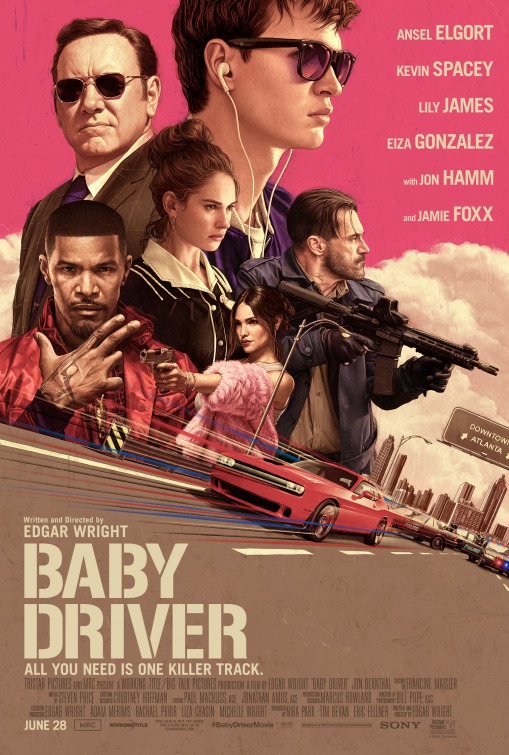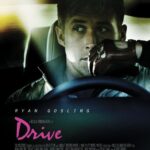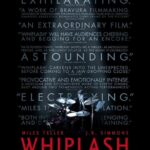All You Need Is One Killer Track
Director
Edgar Wright
Starring
Ansel Elgort
Lily James
Kevin Spacey
The titular Baby [Elgort] is a young and extremely talented driver working for a shady criminal group, run by Doc [Spacey], to pay off an accrued debt. Despite not working with the same crew twice, Doc insists Baby acts as driver on every heist. Thanks to a childhood accident, Baby developed tinnitus and uses a variety of musical tracks to enhance his focus, allowing him to perform incredibly impressive feats behind the wheel. With his debt almost paid off, Baby meets a young diner waitress, Debora [James] and becomes immediately enraptured. Both fall heavily for each other but Doc reveals that there is yet another job, reuniting Baby with felons Buddy, Darling and the extremely unstable Bats, played by Jon Hamm, Eiza González and Jamie Foxx respectively.
Aside from the colossal success of the Fast & Furious franchise, the “fast car” film isn’t nearly as prevalent or popular as it was in decades past. There have been a few notable revivals such as Death Proof, Drive and The Transporter which lean into the importance of the car itself as a setting or personality, ensuring the stunts have a weight and impact to them which simply can’t be replicated by computer generated effects. Baby Driver attempts the same thing and, when it works, is exceedingly commendable but with so many erratic cuts the achievement of the stunts in question are lost on the audience. In other words, fast paced camera movements and quick cuts butcher what should be a white-knuckle thrill ride, leaving us with a reasonably impressive but relatively hollow experience.
Before we go any further, we need to address what will no doubt be an unpopular opinion: Edgar Wright is not making good movies. To unpack that bold statement, let’s draw an unnecessarily unfavourable side-by-side comparison with someone like Quentin Tarantino. Tarantino’s career has been one of defiance, producing ambitious surprisingly humorous films that shouldn’t work or appeal to mainstream audiences but succeed all the same. In this regard, the two directors are alike. Tarantino’s love of classic cinema dictates how he writes and shoots a film. Wright is similarly influenced but doesn’t take the method onboard, choosing instead to employ his signature hyper-caffeinated style. With his earlier projects, this was welcome and very refreshing but it doesn’t automatically translate to every story type. Then we have the musical influence, Tarantino has never trusted composers to score his films, choosing obscure tracks that he likes – much to a film’s detriment, in my opinion – but this toe-tapping, head-nodding mixtape of hits is something audience members seem to love, especially with the same method adopted for something like Guardians Of The Galaxy. As with Guardians, Baby Driver’s inclusion of these tracks has an actual narrative grounding but the choice of tracks is much more on-the-nose and lacks that obscurity. In other words, you love the track because you love the film not love the film because you love the track.
But to address the specifics of not making good movies, Wright’s latest releases have been perfectly acceptable but all of them have faltered in the script phase. Scott Pilgrim was a great adaptation that fell apart at the end because it didn’t understand its main character, The World’s End introduced some very interesting ideas about identity and growing up but failed to execute any of them pleasingly and Baby Driver tries so hard to be cool but the final product is very sophomoric, bringing to life an idea of coolness as conjured up by a teenager. I will be the first to admit there is an exceptionally high amount of really inventive and entertaining moments or scenes but the story as a whole is so incredibly thin and derivative; while it may be a popular move, the story of a criminal who says “One more job, then I’m out” is eye-rollingly cliché. Subsequently, we’re left with a music video movie montage that is very much 70/30 style to substance with each individual segment having some standout thrilling moments but little to actually invest in. A great many critics watched Ant-Man and mused how exciting it could have been had Wright stayed on as director. Well, now that we’ve witnessed an Edgar Wright heist film, I think Ant-Man dodged a bullet.
To ease back on the berating for a second, there are plenty of elements present that really elevate this film. Wright’s biggest problem seems to be the scripts he produces but the level of detail and on-screen flare is extremely impressive. Say what you will about the motivation for anything any of the characters do, no one can deny that some physical article that could be background or minuscule has been meticulously thought out, even to the degree that it directly affects camera movement or placement. During one of the opening sequences, Baby leaves the safehouse to pick up coffee, subtly dancing to the rhythm of his selected track – it’s the kind of free escapism that many of us feel but few ever act upon. So that relatability alone makes for a fun scene. In the background, however, through the use of graffiti, posters and signs we see the lyrics of the song discreetly manifesting around the lead. The amount of planning and prep work that must have gone into getting that to line up must have been quite extensive and really speaks volumes to Wright’s skill as a visual director. But as I said before, this is a music video trope, without furthering the story it becomes little more than a gimmick – to me, the most successful use of this kind of direction was Webb’s eclectic stylings in 500 Days Of Summer. But the fact this level of scrutiny has been utilised here makes it even more frustrating that it’s not present in the story.
But even when a film’s plot falters, sometimes we can be sucked in by charm, by the performances, by the desire to see these people either fail or succeed. At times, Wright has created nuanced, interesting and deep character portrayals but mostly they are two dimensional one-note jokes. Most notably, we need to talk about how Wright portrays women. In literally every release he’s produced, women are such an afterthought; reactionary, weak, undeveloped and inconsequential. The first of our two token female characters in Baby Driver are Buddy’s partner in crime, Darling, who is little more than a sex object. She is Buddy’s plus one and while he gets a backstory about his cocaine-addled Wall Street banker days, she is reduced to “his favourite stripper.” Sure they’d die for each other, or whatever, but she seems to have no discernable and unique skill or ability other than she comes packaged with Jon Hamm’s character. Then we have Debora, the film’s female lead. Now I’ll openly admit the central love interests are both fittingly “weird” in their own right and wear their quirks on their sleeves but, much like Darling, while Baby is given a great deal of backstory, motivation and personality, Debora is just along for the ride because she falls madly in love with this mysterious enigmatic young man. We are given a brief glimpse into some sort of backstory about having someone to care for but that’s really it. This woman exists as a diner waitress solely looking for someone to latch on to. I mean, we’ve got the oedipal thing going on in that Baby ends up falling for a waitress who not only works at the diner his mother did but looks oddly similar but none of that expands on who this woman is. She just meets this guy, gets swept up in the journey and is little more than a pawn to be manipulated and dictated to from start to finish. If it was a one-off I wouldn’t lay into so much but literally EVERY SINGLE Edgar Wright film produces these laughable female characters and it’s fucking tiring. The other thugs appear in two forms, bumbling ineptitude or menacing villain. The only one who sort of walks an interesting line is Buddy but even then he eventually declines into a Michael Myers style adversary who simply won’t die – I don’t know if the film intentionally foreshadows that or not but given Wright’s tendency to hide clues, it’s more than possible.
But what of Baby himself? Ansel Elgort gives us a wistful, borderline spectrum performance with a lot of energy and slick James Dean suaveness and his fascination with music feels like a fairly natural and logical feature, all things considered. I’ll admit, I wasn’t entirely convinced of the transition between awkward dreamy kid to parkour menace who pulls a Batman every five minutes by miraculously disappearing into thin air, nor was it clear when the hell this film was set, drawing on both a childhood with seventies and early 2000’s vibes simultaneously but we can all suspend a modicum of disbelief. To a point. Toward the end of the film, the gun-toting practically psychotic Bats makes an incredibly astute observation in that you can’t trust someone who hasn’t got their mind on the mission. Having worked with a previous driver who had to listen to a certain track made him a liability, jeopardising a job because several “hex songs” came on the radio. This sets up a potentially wonderful and disastrous predicament for Baby that eventually arrives when he steals a car and races through radio stations looking for an appropriate track but nothing comes of it. After revealing this kid’s kryptonite, there’s no fallout when he encounters that very problem – which is such a wasted opportunity for depth and originality.
Ultimately, Baby Driver is an escapist film, one reliant upon sheer looks and slick action. There’s evidently a heart desperately trying to push through but it gets lost in trite developments and a few confused messages along the way. While this will be enough to seduce the bulk of cinemagoers, I can’t help but feel disappointed with something that failed to really push the boundaries in terms of excitement or fun.
Release Date:
30th June 2017
The Scene To Look Out For:
**Spoilers within**
One of Baby’s little quirks is his obsession with making recordings of people and sampling them into electronic music. There’s nothing particularly wrong with this kind of character attribute but holy fuck if it’s not the stupidest thing to do in a film involving criminals. The second it’s revealed that he records almost all of his heist missions, I was convinced the tapes would play a large role in exposing the crime syndicate or used as leverage. Instead, Baby innocently explains they are simply mixes and the consequences are all but non-existent. It’s frankly astonishing. The tapes, by the way, aren’t then destroyed, they are just kept to one side. It’s an absolutely fascinatingly dumb inclusion that makes so little sense outside of the nostalgic use of tapes and personal mixes – which are growing in popularity with a generation who didn’t really have cassette tapes.
Notable Characters:
**Spoilers again**
Kevin Spacey’s character is very vanilla. Not because the portrayal is bad or the character is flat but because there’s nothing especially new to it. Doc could easily be any number of Spacey’s previous roles, albeit watered down. What really irked me, though, was the dramatic tonal shift by the end fo the film. Throughout we learn that Doc is some powerful kingpin with whom Baby has a huge debt to clear. Once he’s finally cleared it, he mistakenly believes he can walk away from the criminal life. At that point, Doc reappears and does the typical crime boss thing and threatens death or physical harm to Baby and everyone he knows or cares about; revealing that he has known all about everything Baby has tried to keep private – again, a standard genre trope. But it’s evident that Doc has a soft-spot for Baby and genuinely wants to work with him. All fair and good so far, I’ll even give a pass to Doc trying to defend Baby’s bloody tapes but to then suffer a major personality shift just because the plot required it felt so cheap. Essentially, despite refusing to help the kid, Doc goes on to not only return a specific tape but gives him a stack of money, a car to escape with and then sacrifices himself taking on the cops and a vengeful Buddy. The seeds were there – buried deep but still present – but nothing on a level to warrant that kind of action.
Highlighted Quote:
“Who doesn’t like hats?”
In A Few Words:
“Rather than a refreshing, fun, cool, polished romp Baby Driver is a bromidic damp squib”
Total Score: 2/5
![The Red Right Hand Movie Reviews [Matthew Stogdon]](https://reviews.theredrighthand.co.uk/wp-content/uploads/2021/12/cropped-header1.png)




